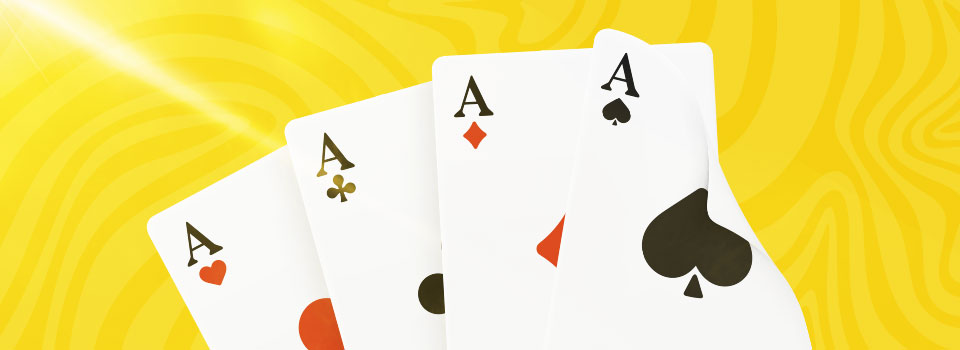There are millions of poker players all over the world, from Las Vegas to Paris, Monte Carlo and more. Poker is one of the most popular card games ever and has many alternative versions, and Four-Card Poker is one of the newest. It pits players not only against each other but against the dealer.
Read on to learn the basic rules of Four-Card Poker and whether it’s the right version for you.
WHAT ARE THE RULES FOR FOUR-CARD POKER?
The game Four-Card Poker is when punters play against the dealer with the aim of trying to beat the dealer’s four-card poker hand each round.
Players start by placing an Ante bet or Ante-up bet. The player receives five cards face-down, and the dealer receives six cards — five face-down, and the sixth card will face up.
Players can then raise or fold. They need to raise at least the amount of their Ante bet to stay in, and they can raise it up to three times.
Players then discard a card to make the best possible four-card poker hand. The dealer will then reveal their four-card hand. If neither the dealer nor the player has a pair or better, the hand with the highest card wins. However, if the player’s hand beats or ties the dealer’s hand (the player wins ties), the Ante and Play bets pay out even money.
On top of that, a player wins an automatic bonus payout when their four-card hand features a three-of-a-kind or better.
ANTE WAGER
The Ante bet is one of the few betting options available and is the initial wager placed before any cards have been dealt. It’s the amount players are willing to bet that their four-card hand beats the dealer’s hand.
ACES UP WAGER
An Aces Up wager is a bet that you’ll receive a pair of aces or better. The payouts for the Aces Up side bet include:
| Poker Hand | Payout |
| Four-of-a-kind | 50:1 |
| Straight Flush | 40:1 |
| Three-of-a-kind | 8:1 |
| Flush | 5:1 |
| Straight | 4:1 |
| Two Pair | 3:1 |
| Pair of Aces | 1:1 |
This bet is risky but also a way to increase your winnings. Remember that when a player bets both the Aces-up side bet and the Ante wager, they are playing with two independent paytables.
PLAY WAGER
The Play bet is an optional additional bet. It can be one to three times larger than the ante wager. It’s necessary if the player wants to remain in the game. As mentioned, players will receive bonus payouts for placing an Ante wager and Play wager:
| Poker Hand | Payout |
| Four-of-a-kind | 25:1 |
| Straight Flush | 20:1 |
| Three-of-a-kind | 2:1 |
SIX-CARD BONUS
The Six-Card Bonus is another optional side bet that can be made before any cards are dealt. It combines six cards (your five cards and an additional bonus card) to make the best hand out of five cards. You’ll need to put down the original Ante bet and the Aces Up wager first.
WHAT ARE THE ODDS IN FOUR-CARD POKER?
The probability of getting each hand is:
- Four-of-a-kind: 0.00005%
- Straight flush: 0.00016%
- Three-of-a-kind: 0.0092%
- Straight: 0.0102%
- Two pairs: 00104%
- Flush: 0.0104%
- Pair: 0.3042%
- High card: 0.6553%
These odds tie in when forming a Four-Card Poker basic strategy.
HAND RANKING IN FOUR-CARD POKER
The hand rankings are similar to those in other poker games but with only four cards. From best to worst, these include:
- Four-of-a-kind
- Straight flush
- Three-of-a-kind
- Flush
- Straight
- Two pair
- Pair
- High card
The ace is the highest-ranking card, no matter which four-card hand it appears in.
FOUR-CARD POKER STRATEGY
The most important things to consider when it comes to forming a Four-Card Poker strategy are the cards you hold in your hand and the one the dealer shows.
Only play three times your Ante bet if you have a pair of 10s or better. Go for one times the Ante bet with a pair of nines or lower. Fold if you don’t have at least a pair.
If you have a pair of face cards, only wager three times when the dealer’s face-up card is lower than your pair. If it’s more, go for one time or two times your Ante wager.
PROS AND CONS OF FOUR-CARD POKER
There are at least 12 other types of poker games in addition to Four-Card Poker. Choosing the best one is important for your time as well as wallet. The pros and cons of Four-Card Poker can help you see if it’s the right one for you.
ADVANTAGES
Several factors set Four-Card Poker apart from other versions. A few examples include:
- No need to play against other players.
- No bluffing.
- Similarity to other games like blackjack.
DISADVANTAGES
There are also reasons why Four-Card Poker may not be your favourite version of poker. They include the:
- Substantial house edge.
- Low excitement value compared to games like craps.
- Low profitability.
A basic strategy can help you make the most money, but you may not have as much fun playing it. Watch and play a few games to see if it sounds interesting.

 English
English  Polish
Polish  Ukrainian
Ukrainian  Russian
Russian  Greek
Greek  Portuguese (Brazil)
Portuguese (Brazil)  Slovenian
Slovenian  Hungarian
Hungarian  German
German  Spanish
Spanish 
